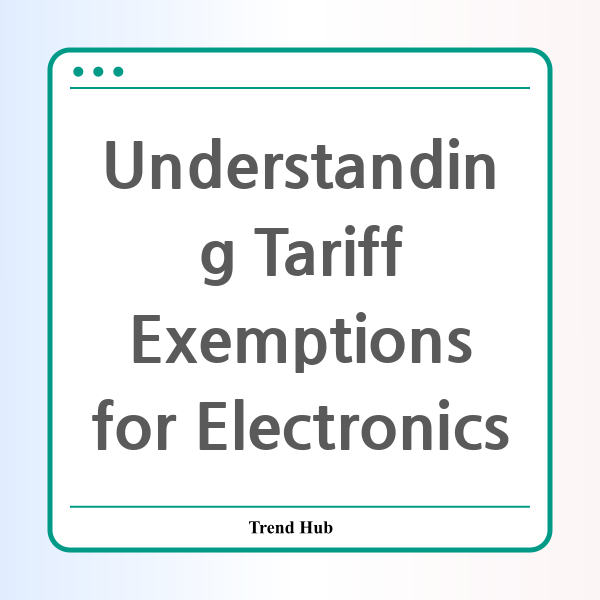* This website participates in the Amazon Affiliate Program and earns from qualifying purchases.

Are Tariff Exemptions the Key to Affordable Electronics?
In recent news, the Trump administration announced significant tariff exemptions that are causing a buzz in the electronics industry. With smartphones and computers now exempt from hefty tariffs imposed on Chinese imports, it raises the question: what does this mean for consumers and tech companies alike?
The announcement from U.S. Customs and Border Protection came late on a Friday when many were wrapping up their week. The decision exempts various electronics, including smartphones, computer monitors, and essential components such as semiconductors from a minimum tariff rate of 145% on many imported goods from China. This exemption applies to products entering the U.S. from April 5 and aims to alleviate concerns about rising electronics costs for American consumers.
Many tech giants, especially Apple, have been holding their breath regarding the tariffs. With approximately 90% of the production and assembly of iPhones occurring in China, any hike in import costs could lead to a surge in retail prices. Currently, it is estimated that Apple has a six-week inventory of iPhones in the U.S. Once that supply diminishes, the exemption announcement becomes crucial for both the company and millions of consumers who depend on their devices.
Furthermore, the administration's decision reflects a nuanced approach to the ongoing trade war with China. While the tariffs were intended to bring manufacturing jobs back to the United States and counteract decades of trade imbalances, they also risked inflating prices for consumers on a wide variety of everyday electronics. By allowing exclusions for important products, the administration seems to acknowledge that many electronic components are not easily produced domestically. These include semiconductors and microchips, which are pivotal for numerous tech products.
This exemption is also significant for Asian semiconductor manufacturers such as Taiwan Semiconductor Manufacturing Company, Samsung, and SK Hynix, who have been heavily relied upon for their cost-effective production methods. An exemption allows these companies to maintain a competitive edge in the global market while also supporting U.S. companies who depend on their products.
As the story continues to develop, it will be essential to monitor how these tariff exemptions will affect the overall electronics market. Will these exemptions lead to more affordable prices for consumers? Or will the cost of production still find a way to impact retail prices? The ongoing discussions surrounding tariffs highlight the complexity of the global trade landscape and its direct correlation to consumer pricing and market stability.
In conclusion, the recent decision to exempt smartphones and computers from tariffs is a pivotal moment in the tech industry. As the global economy continues to evolve, understanding these changes can empower consumers and businesses alike to adapt and thrive amidst uncertainties in the market.
* This website participates in the Amazon Affiliate Program and earns from qualifying purchases.